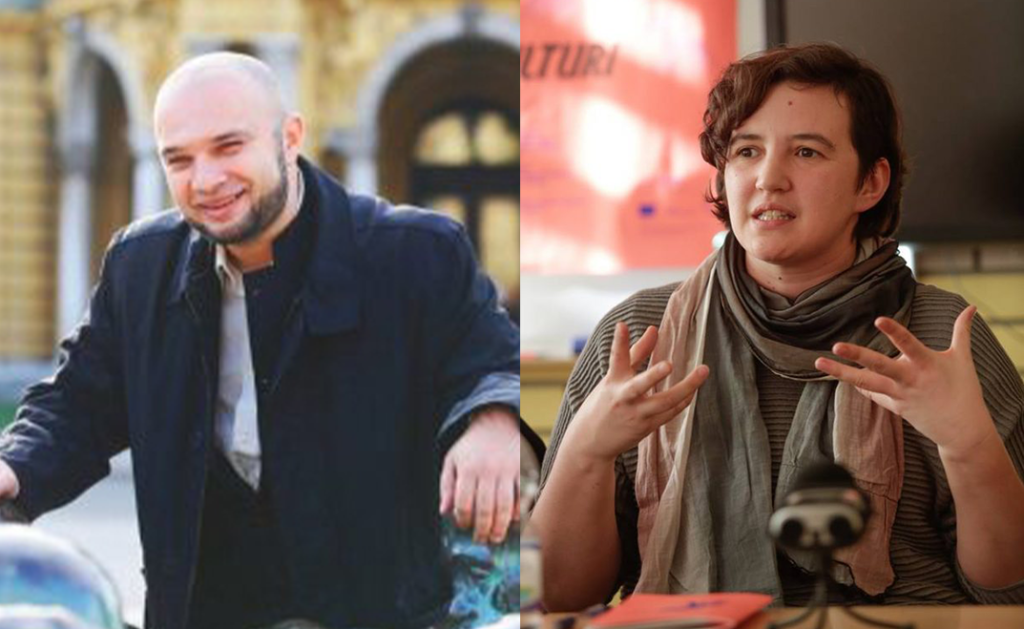
Siniša Senad Musić & Josipa Lulić
(Croatia) for Center for The Theatre of The Oppressed Pokaz
Overview
Title of the Intervention : Easy Way Out
Entity that promoted the initiative: Roma Youth Organisation of Croatia (ROM HR) and Center for Theatre of the Oppressed POKAZ (POKAZ)
When it was implemented? September 2023 – November 2024 (first phase). The campaign is still ongoing
Numbers of participants: There is a core of 9 people working on organising and developing the plan; the total number of performers (actors and facilitators) is 13; our estimate for the total number of audience members and participants (all performances and events) is 250
Where we are: Croatia
Place/Places: We worked with both the Roma community and various potential allies, attempting to gather a broad coallition behind our initiative. We performed throughout Croatia and presented the initiative in Bruxelles and Budapest
Period/Time available: -We started 15 months ago, and the Initiative is still ongoing
We are situated in Croatia, where the Roma minority has been facing historic discrimination through centuries. This culminated during the Second World War, when the Nazi puppet Indepent State of Croatia (NDH) implemented racial law and commited a genocide murdering over 90% of Roma population on the teritories it controled. Today Roma population is facing heavy discrimination in all aspects of life, from the life expectancy (10 years less than the majority population) to the discrimination in employment and extreme poverty. Northern Croatia (Međimurje county) is the home to the majority of Roma population. They mostly live in rural segregated settlements – for a lot of children the frist time they meet a non-Roma person is when they come to school (and then also only the teacher, since the education, especially for the grades 1-4 is also segregated).
Aim/Goal of the action – Main theme of the Legislative Proposal to Propose/Support
Equal access to quality education, specifically the push for the Ministry of education to adopt the action plan on desegregation.
Desegregation of schools and better learning outcomes for Roma students generally.
Which level of change the entity want to reach?
Legislative change at the country level (adoption of the action plan for desegregation), and implementation on the local and school levels
Public position of the proposing entity:
– What was the public position of the proposing entity, and its relationship with the community?
ROM HR is a Roma-led organisation. POKAZ is a resource organisation that is providing knowledge of TO, and that has been working closely wiht ROM HR for 5 years. All of the actors in the play faced discrimination in schools, with half of them experiecing segregated schooling and growing up in segregated settlements. ROM HR has been strongly advocating for desegregation in public for years.
– What was its stance on the subject of the intervention?
Unequal access to quality educaton was perceived by both organisations as one of the greatest problems in Croatia, and a clear injustice that needs to be corrected.
What is the connection to the decision makers? Which power the entity has?
Members of ROM HR have been part of different initiatives that were consulted by some actors (specifically Ministry of Education). One person was selected by the European Commission to write a shadow report on the human rights of Roma in Croatia. Both organisations are NGOs, and have no decision-making power.
Target
Roma students
Internal Allies
The Roma community in Croatia; national and local Roma associations, such as the Roma Cultural Centre in Darda, which provided spaces for performance and discussion, as well as a link with local audiences
External Allies
NGOs in the field of education and human rights; they have been discussing the issue with the GOOD Initiative (Civic Education Initiative — a network of organisations dedicated to implementing civic education throughout Croatia); they met with the European Roma Rights Centre, who included their criticism of the Croatian situation in a Rule 9 Report in its case against Macedonia, as well as with the Minority Rights Group Europe, through which they have connected with organisations in other countries (i.e. Slovakia and Bulgaria) dealing with similar issues; teachers at educational institutions such as the Zagreb University School of Social Work and the Faculty of Teacher Education have opened the space within their classrooms and their courses for the performances and discussion with audiences consisting of teachers and students; Vedrana Spaić-Vrkljaš, professor at the Faculty of Humanities and Social Sciences, has shared the unpublished results of a research she conducted on educational outcomes in segregated classes;
Describe each steps of the initiative
In September 2023, the organising core assembled, and, reinforced by a few more actors, came up with the first draft of the Easy Way Out play ove a weekend workshop.
In late 2023 and early 2024 we staged it in several locations, whilst developing the broader social and activist initiative. We presented the Initiative in Budapest and Bruxellles, at advocacy meetings of Minority Rights Group Europe, in March 2024 and September 2024 respectively.
In March 2024 we held two more workshop, during which the play came about to its current form. We continued to play it for various audiences, both within and outside the community (Roma Cultural Center in Darda, Zagreb Faculty of Social Work).
During the summer of 2024, drawing on the feedback of various audiences, collaborators, partners and allies, we drafted the proposals for educational reform, and sent them to the City of Zagreb.
In October and November 2024, we ran an Instagram campaign under the slogan Better Education for All.
In November 2024 we held a public discusssion about the proposals in Zagreb.
Reflections and Methodology
Outcomes and Impact
Resources and Contacts
Contact person: Siniša-Senad Musić, Roma Youth Organisation of Croatia (ROMHR)/POKAZ, smusic@rom.hr; Josipa Lulić, POKAZ, josipa@pokaz.hr
Materials, links to consult:
